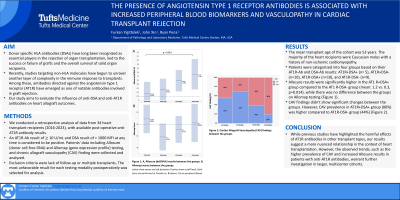(P410) The presence of angiotensin type 1 receptor (AT1R) antibodies is associated with increased peripheral blood biomarkers and vasculopathy in cardiac transplant rejection.
Location: Platinum Ballroom

Poster Presenter(s)
Aim: Donor specific HLA antibodies (DSAs) have long been recognized as essential players in the rejection of organ transplantation, tied to the success or failure of grafts and the overall survival of solid organ recipients. Recently, studies targeting non-HLA molecules have begun to unravel another layer of complexity in the immune response to transplants. Among these, antibodies directed against the angiotensin type 1 receptor (AT1R) have emerged as one of notable antibodies involved in graft rejection. Our study aims to evaluate the influence of anti-DSA and anti-AT1R antibodies on heart allograft outcomes.
Method: We conducted a retrospective analysis of data from 34 heart transplant recipients (2016-2023), with available post-operative anti-AT1R antibody results. An AT1R-Ab result of ≥ 10 U/mL and DSA result of ≥ 1000 MFI at any time is considered to be positive. Patients’ data including Allosure (donor cell-free DNA), and Allomap (gene expression profile) testing, and chronic allograft vasculopathy (CAV) finding were collected and analyzed. Exclusion criteria were lack of follow-up or multiple transplants. The most unfavorable result for each testing modality postoperatively was selected for analysis.
Results: The mean transplant age of the cohort was 53 years. The majority of the heart recipients were Caucasian males with a history of non-ischemic cardiomyopathy. Patients were categorized into four groups based on their AT1R-Ab and DSA-Ab results: AT1R+DSA+ (n= 5), AT1R+DSA- (n=10), AT1R-DSA+ (n=10), and AT1R-DSA- (n=9). Allosure results were significantly higher in the AT1R+DSA+ group compared to the AT1R-DSA- group (mean: 1.2 vs. 0.3, p=0.014), while there was no difference between the groups on allomap testing (Figure 1). CAV findings didn’t show significant changes between the groups. However, CAV prevelance in AT1R+DSA+ group (80%) was higher compared to AT1R-DSA- group (44%) (Figure 2).
Conclusion: While previous studies have highlighted the harmful effects of AT1R antibodies in other transplant types, our results suggest a more nuanced relationship in the context of heart transplantation. However, the observed trends, such as the higher prevalence of CAV and increased Allosure results in patients with anti-AT1R antibodies, warrant further investigation in larger, multicenter cohorts.
Method: We conducted a retrospective analysis of data from 34 heart transplant recipients (2016-2023), with available post-operative anti-AT1R antibody results. An AT1R-Ab result of ≥ 10 U/mL and DSA result of ≥ 1000 MFI at any time is considered to be positive. Patients’ data including Allosure (donor cell-free DNA), and Allomap (gene expression profile) testing, and chronic allograft vasculopathy (CAV) finding were collected and analyzed. Exclusion criteria were lack of follow-up or multiple transplants. The most unfavorable result for each testing modality postoperatively was selected for analysis.
Results: The mean transplant age of the cohort was 53 years. The majority of the heart recipients were Caucasian males with a history of non-ischemic cardiomyopathy. Patients were categorized into four groups based on their AT1R-Ab and DSA-Ab results: AT1R+DSA+ (n= 5), AT1R+DSA- (n=10), AT1R-DSA+ (n=10), and AT1R-DSA- (n=9). Allosure results were significantly higher in the AT1R+DSA+ group compared to the AT1R-DSA- group (mean: 1.2 vs. 0.3, p=0.014), while there was no difference between the groups on allomap testing (Figure 1). CAV findings didn’t show significant changes between the groups. However, CAV prevelance in AT1R+DSA+ group (80%) was higher compared to AT1R-DSA- group (44%) (Figure 2).
Conclusion: While previous studies have highlighted the harmful effects of AT1R antibodies in other transplant types, our results suggest a more nuanced relationship in the context of heart transplantation. However, the observed trends, such as the higher prevalence of CAV and increased Allosure results in patients with anti-AT1R antibodies, warrant further investigation in larger, multicenter cohorts.

